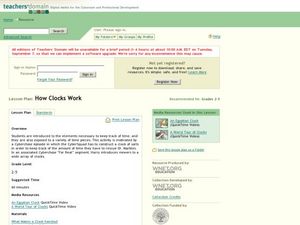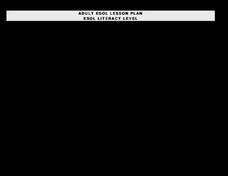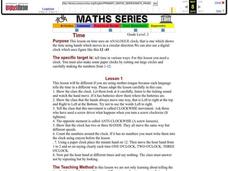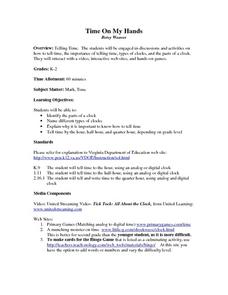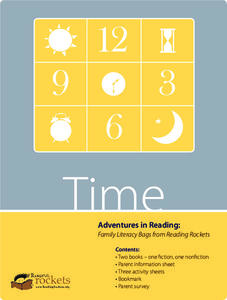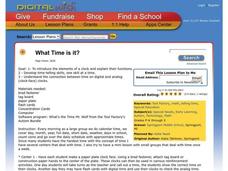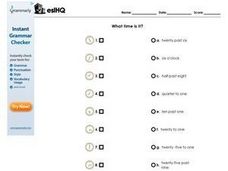Curated OER
What Time Is It? File Folder Game
Use a manila folder to make a clock game with these adorable time-related printables. The materials include an analog clock and a digital clock with all the related equipment, such as clock hands and numbers. Laminate or make the movable...
Curated OER
Clocks and Watches
Telling time is an important skill. Beginners to this concept determine the time to the nearest half hour using both digital and analog clocks. There are two examples here demonstrating the form scholars should use when recording each...
Curated OER
It's About Time!
Learners examine concept of time, and explore difference between analog and digital clocks; students make art project to represent time and create a time-story problem and solution.
Curated OER
Digital Clock
In this math worksheet, students practice telling time to the minute on a digital clock by making a paper clock with a pattern. Students cut out the clock and the slits for the numeral strips and thread them through the clock face....
Curated OER
How Clocks Work
Students discover time pieces and complete telling time activities. In this time lesson, students complete a worksheet about what make a clock keep time. Students watch a video about time and clocks as well as a video about an Egyptian...
The Digits
Telling Time: The Digits
Time to teach your students how to read a clock? This resource is here to help! Engaging young mathematicians with two fun videos and a series of hands-on activities, these lessons offer a multimedia approach to teaching this important...
Curated OER
Telling Time in Words
Writing out time can be tricky! Give your scholars practice with this pair of worksheets featuring both analog and digital clocks. They read the times and write it out in the boxes provided. Make sure you specify that learners are to...
Curated OER
Teaching Students to Tell Time
Several activities are provided for your young learners to practice telling time. One suggestion is to provide each learner with their own clock. After you read the time, each learner must place the clock's hands in the correct place and...
Curated OER
Telling Time With Clocks/Bingo “Time”
Young learners create a clock by adding hands and placing the numbers in the correct location. After each learner has their very own clock, they explore each component. Review on the hour times, and then introduce them to five-minute...
Curated OER
Digital-to Analog Conversion
In this electrical circuit worksheet, students answer a series of 13 open-ended questions about digital-to-analog converter circuits. They analyze schematics in order to answer the questions. This worksheet is printable and the answers...
Curated OER
What Time Is It?
Fourth graders distinguish between analog and digital clocks and read time from both types. In this clock reading lesson, 4th graders discuss the types of clocks and the time zones. Students find times in specific time zones. Students...
Curated OER
ESOL: Time and Money
Students study the parts of an analog and digital clock. They create paper clocks to identify telling time to the hour, half-hour, and quarter past and quarter after. They practice tellng time in pairs.
Curated OER
Time
Here, learners review telling time using an analog clock. They use a clock to tell time, make a paper clock, and discuss the concept of elapsed time. However, the lesson is not always easy to follow, nor are the questions clear.
Curated OER
Telling Time, Part 2
Compare time on an analog clock and a digital clock with a learning exercise that prompts third graders to write the given times into both clocks. An example at the top of the page demonstrates how to write the time for both clocks. A...
Curated OER
Time On My Hands
Young learners engage in discussions and activities on telling time, different types of clocks, and how the parts of a clock actually work. The engage in interactive websites, hands-on games, and watch a video on the art of the clock and...
PBS
Reading Adventure Pack: Time
An activity packet explores the concept of time. First, scholars read two stories—The Very Grouchy Ladybug by Eric Carle and Telling Time: How to Tell Time on Digital and Analog Clocks! by Jules Older, illustrated by Megan Halsey....
Curated OER
Telling Time as an Everyday Use of Numbers
How can we estimate time? Have your young mathematicians make a clock. Then they compare and contrast types of clocks. They practice writing times in two different ways and make a book about telling time.
Curated OER
High-Definition Digital Television: Why Make the Switch?
In this digital television worksheet, students read about the advantages of using digital television. They answer three critical thinking questions about the advantages and disadvantage of digital television.
Curated OER
Clocks and Time
Second graders observe and demonstrate how to tell and write time. They discuss different ways and things that tell time, then listen to a teacher-led lecture about the hands on a clock. Students complete a worksheet along with the...
Curated OER
Time: How To Tell What Time It Is
Learners practice telling time using analog and digital clocks. In this time telling lesson, students read the book The Grouchy Ladybug by Eric Carle, and practice telling the time on a model clock that is constantly changing....
Curated OER
My Time Book
First graders write a time book. In this writing and telling time lesson, 1st graders learn about the concept of time using a Judy clock. Students read a book about a ladybug and look closely at the time on the clock. Students then...
Curated OER
What Time is it?
Students participate in three centers focused on developing time-telling skills. In this time activity, students create their own paper plate clock face, play "Time Concentration" using times on the hour and half hour, as well as,...
Curated OER
ESL "What Time Is It?" Analog Clock/Time Matching Worksheet
In this ESL telling time instructional activity, students examine 10 pictures of analog clock faces. They match the time on the clock with the time.
Curated OER
Introduction to Hours & Minutes
First graders identify, interpret, and gain proficiency in using a clock to tell time to the hour and determine how many minutes are in an hour. They identify and list what they do as they travel through their dayand how much time you...




